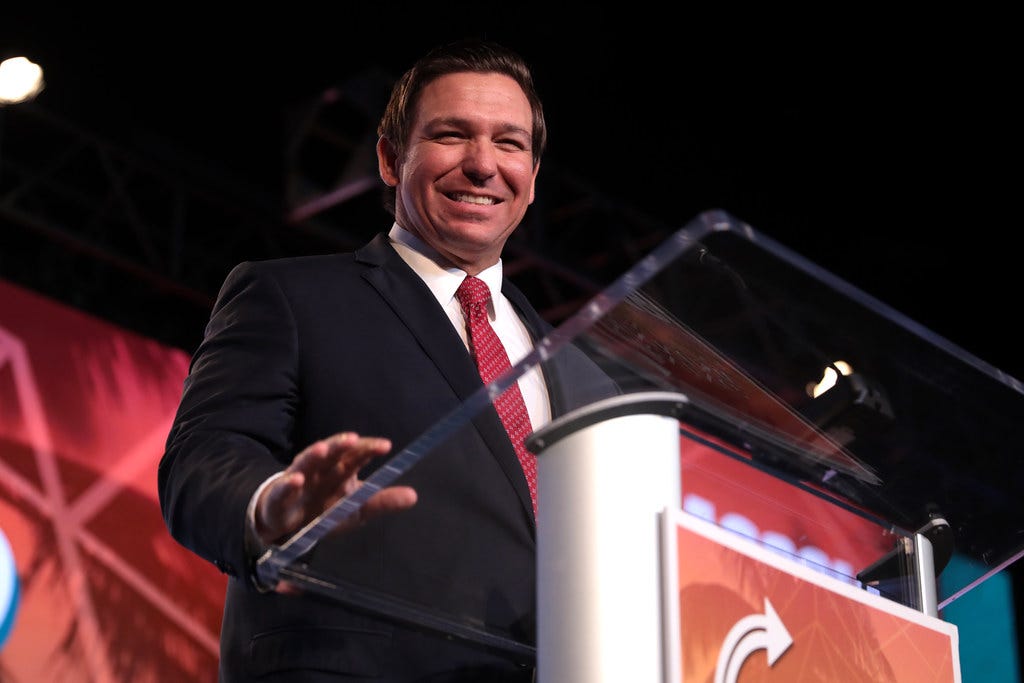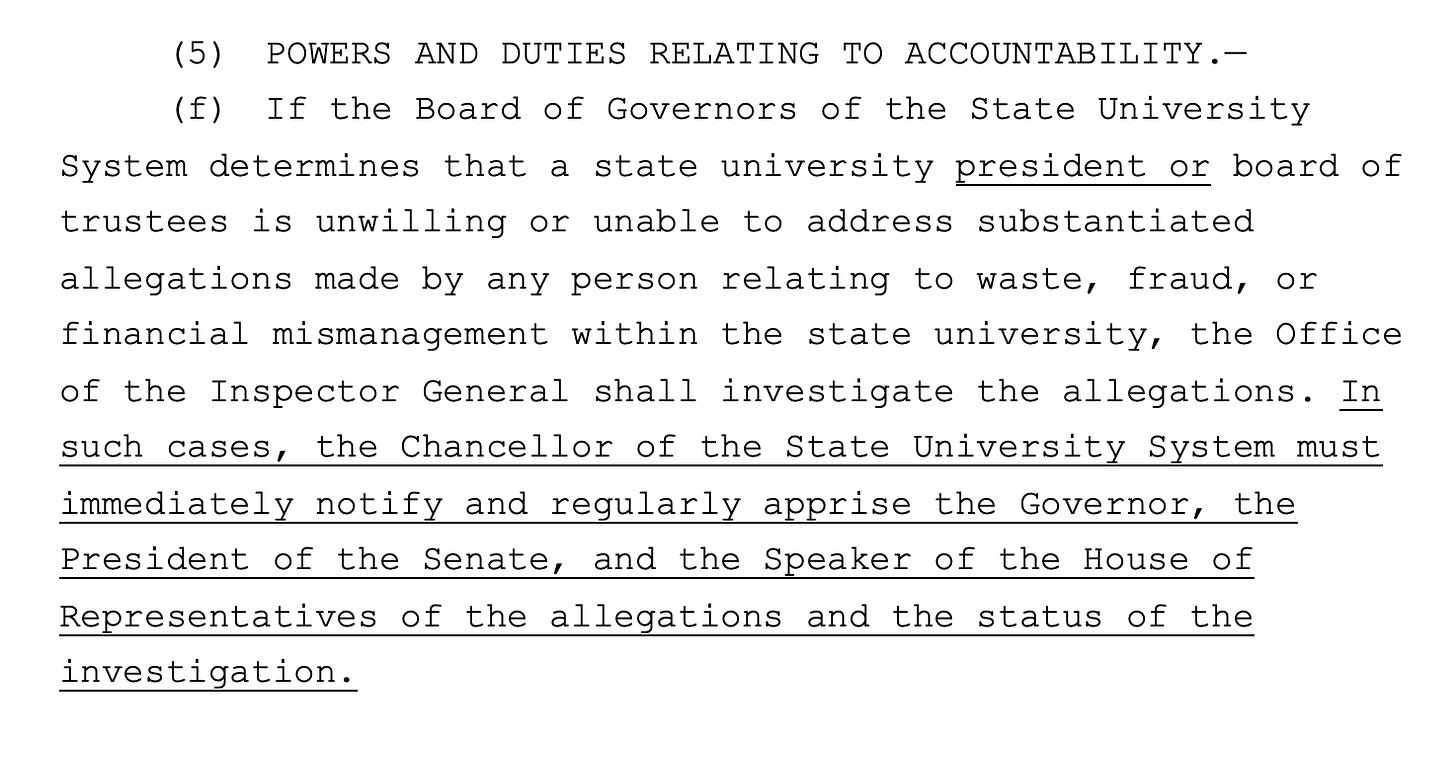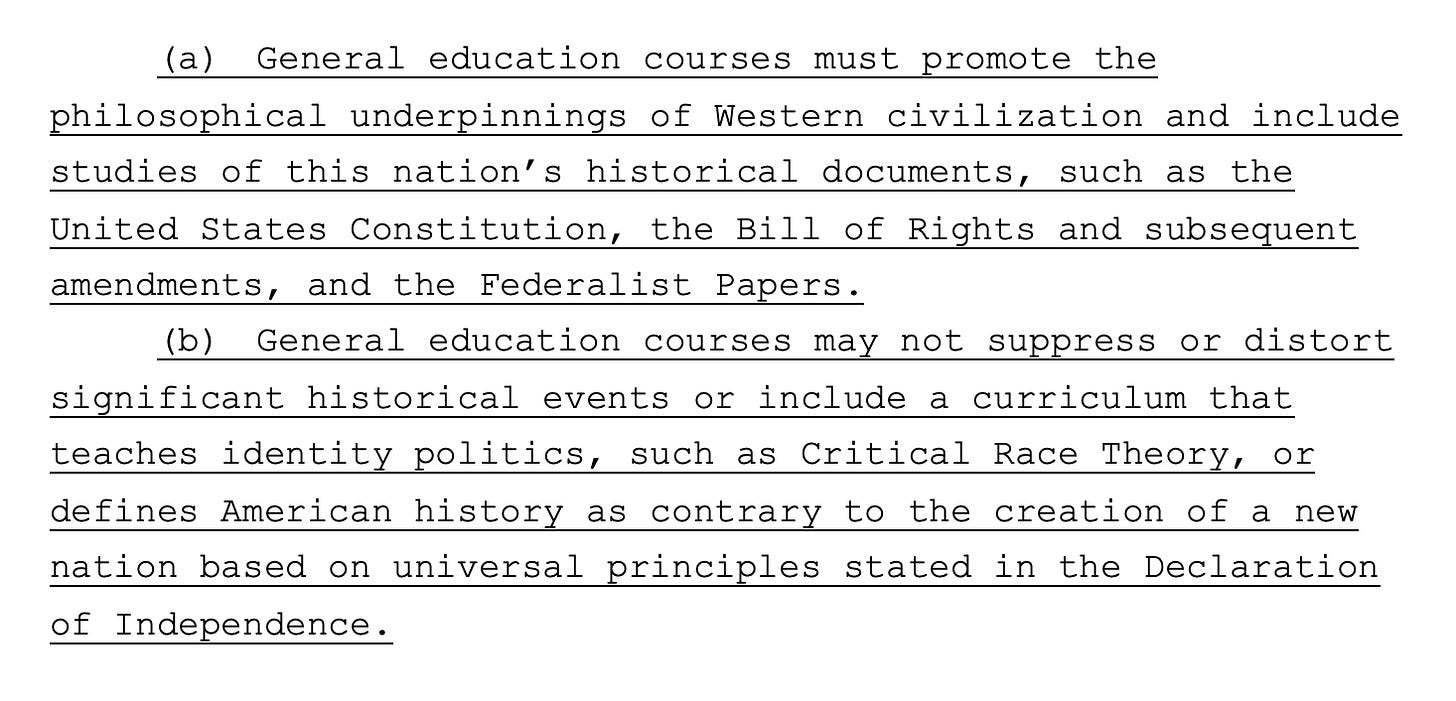Ron DeSantis plotted an all-out assault on public universities
Records show Florida's governor drafted plans to strip autonomy from individual universities and colleges, centralize power in Tallahassee, and impose more restrictions on what students are taught.

This is Seeking Rents, a newsletter and podcast devoted to producing original journalism — and lifting up the journalism of others — that examines the many ways that businesses influence public policy across Florida, written by Jason Garcia. Seeking Rents is free to all. But please consider a voluntary paid subscription, if you can afford it, to help support our work.
Over the past year, Gov. Ron DeSantis and his allies in the Republican-controlled Florida Legislature have been on a crusade against public universities, tarring them as “intellectually repressive” and “socialism factories.”
They have passed laws ordering community colleges and state universities to dig up details about the personal political beliefs of their employees, making it harder for professors to maintain tenure, interfering with university accreditation, and threatening funding for schools that don’t fall in line with the governor’s efforts to control the teaching of slavery, segregation and institutional racism.
And DeSantis may just be getting started.
Records obtained through a series of public-records requests show that DeSantis’ office recently developed a sweeping plan to overhaul higher-education oversight in Florida. The governor’s proposal would have centralized more power in boards run by the governor’s political appointees, made colleges and universities more dependent on money controlled by politicians in Tallahassee, and imposed more restrictions on what schools can teach.
The DeSantis plan would have even stripped university presidents of the ability to hire professors.
Higher education isn’t the governor’s only potential target.
The records show that DeSantis’ staff also drew up proposals targeting newspapers, state attorneys and school boards. They devised plans to take control of everything from local toll-road agencies to high-school sports. And amidst it all, they wanted to make it harder to legally challenge the governor’s own authority.
All these ideas were included in legislation drafted at the request of the governor’s office in the weeks leading up to the 2022 legislative session, which began in January and ended in March. The drafts surfaced in post-session public-records requests seeking copies of communications between DeSantis’ office and the Legislature.
Only a few fragments ultimately made it into bills that were passed into law, though it’s not clear whether that was because DeSantis decided not to pursue them right now or whether legislative leaders privately objected.
But DeSantis could resurrect any of them in the future — whether through executive edict or, if he is re-elected this fall, in future legislative sessions. The governor’s office declined to answer questions about DeSantis’ intentions.
But even if he decides not to do anything further, the DeSantis drafts offer a window into the thinking of one of the most powerful Republican politicians in the United States — one who is widely expected to run for president in 2024.
Attacking higher-ed independence
Ron DeSantis had state lawmakers prepare many pieces of legislation in the run up to the 2022 legislative session. Some led to the session’s most bitter culture-war battles; others never saw the light of day.
None of the DeSantis drafts was more far-reaching than his higher-education package. The 70-page proposal sought to strip public universities and colleges of individual autonomy and concentrate decision-making power in Tallahassee under the Board of Governors, which oversees universities, and the Board of Education, which oversees community colleges.
For instance, the legislation would have given the Board of Governors more authority to initiate investigations of university presidents, veto school budgets and fire university employees. It would have required the board to launch new reviews of existing degree programs. And it would have prohibited the board from delegating many of its administrative powers to individual universities.
Why is this important? The governor has enormous control over the Board of Governors, where he appoints 14 of 17 members, and the Board of Education, where he appoints all seven members.
DeSantis has stacked both boards with friends, fundraisers and ideological loyalists. His appointments include a donor who once gave DeSantis a place to live when he needed a new address; a former education secretary who presided over the failed privatization of an entire school district; a woman who has expressed support for Jan. 6 rioters and the QAnon conspiracy theory that government, business and media are controlled by Satan-worshipping pedophiles; an attorney who defends Republican dark-money groups; a Boca Raton doctor and investor who gave DeSantis $50,000 one week before his appointment (and who has given DeSantis more than $75,000 more since); the CEO of utility giant Florida Power & Light; and a lobbyist for Walmart.
Similarly, DeSantis’ higher-education package would have shifted power away from university presidents and to university boards of trustees.
The most eyebrow-raising example: DeSantis’ plan would have put a university’s board, rather than its president, in charge of hiring faculty. Even if the board wanted to delegate hiring decisions to its president, the legislation would have still required it to approve every hire.
Trustees would also have had to confirm the appointments, reappointments and contracts of every member of a president’s executive management team. And presidents would have had to provide boards with annual performance reviews for every university employee who makes more than $100,000 a year.
Again, DeSantis has tremendous power over university boards, which are typically made up of 13 members — including six appointed directly by the governor and five chosen by the DeSantis-controlled Board of Governors.
The chair of the board at the University of Florida — Florida’s most prestigious university — is a Volusia County developer and major DeSantis and Republican Party of Florida donor, who helped arrange a round of golf for DeSantis at the ultra-exclusive Augusta National Golf Club and has let the DeSantis family use his private plane, and who helped fast-track a $337,000-a-year job at UF for DeSantis’ anti-vaccine surgeon general. (He’s also a prime beneficiary of a $50 million, environmentally destructive highway interchange that the DeSantis administration is building along Interstate 95.)
DeSantis’ other picks for the UF board include the co-owner of a for-profit university in Winter Park, a mergers-and-acquisitions lawyer in Atlanta, and the managing partner of a big law firm in Miami — each of whom has donated more than $100,000 to DeSantis since the governor’s election in 2018.
Bullying by budget threat
DeSantis’ plan would have concentrated power in Tallahassee in other ways, too.
Most notably, the legislation would have made it much harder for colleges and universities to raise money through tuition and fees. Schools would have been forbidden from raising some fees by more than 3 percent or more than once every three years. They would have been barred from raising other fees ever again.
On one level, this might seem like a populist thing to do. The cost of university has soared over the years, forcing many students and families to take on crippling debt loads just to access higher education.
But that’s not the point of fee caps like these. What they are really about is making colleges and universities even more dependent on state funding controlled by DeSantis and the Legislature — and giving the governor and lawmakers more leverage to bully schools using the threat of budget cuts.
In case that wasn’t clear, the governor’s proposal also included provisions explicitly threatening schools with funding cuts if they don’t comply with certain state laws and regulations.
One version of the legislation specifically ordered cuts to universities and colleges that don’t participate in DeSantis’ “intellectual diversity” surveys, which critics have called an attempt to target professors and academic programs that Republican leadership doesn’t like. Another version of the bill would have made the university and college systems submit reports every three months “assuring” the governor and the Legislature that schools aren’t defying any orders from Tallahassee.
And, of course, DeSantis would have used this legislation to enflame further culture wars by imposing new restrictions on what could be taught in general education courses.
General education courses would have had to “promote the philosophical underpinnings of Western civilization.” And they would have been forbidden from including any “curriculum that teaches identity politics, such as Critical Race Theory.”
DeSantis and Simpson bond
Most of DeSantis’ higher-education plans never became anything more than drafts during the session, though some smaller pieces did make it into legislation that passed.
Lawmakers tucked a few elements into SB 7044 — including provisions ordering the collection of more detailed information about general education courses and requiring university and college boards to approve any proposed fee increases by wider margins (for instance, at least nine members of a university board of trustees, which typically has 13 members, would have to agree.)
And sometimes DeSantis’ ideas popped up in different ways — like a provision in SB 7044, added to the bill in an eleventh-hour amendment by DeSantis’ new pick for secretary of education, calling on the DeSantis-controlled Board of Governors to develop new performance reviews for tenured professors. DeSantis signed the bill into law last month.
Then there was what may have been the most insidious change of all: During the final days of session, lawmakers stuck a provision into an education budget bill that threatens universities with funding cuts if they are found to have violated DeSantis’ “Stop WOKE Act,” which restricts how schools can teach about subjects such as institutional racism and the legacies of slavery and segregation.
What makes this provision so dangerous is that it doesn’t leave it up to a court to decide whether a school has broken the law. It also gives that adjudication power to the DeSantis-controlled Board of Governors — and to the Legislature itself.
Emails show this idea came from DeSantis, at the request of Senate President Wilton Simpson.
Indeed, for all the recent tension between the governor and the Senate president, the two Republicans — both of whom are running in statewide elections this year — seem to share a disdain for public universities. Even their staffs use the same bombastic rhetoric as their bosses.
“Kathy, Per the Senate President’s request, please find our suggested budget language to prevent the ‘socialism factories’ from pushing woke course requirements,” Stephanie Kopelousos, DeSantis’ legislative affairs director, wrote in an email to Kathy Mears, Simpson’s chief of staff, sent during the final week of this year’s legislative session.
The Legislature approved DeSantis’ suggestion — almost verbatim — a few days later.
Coming soon: A look at some of the other DeSantis drafts – including plans to make it harder to sue DeSantis but easier to sue newspapers (hat tip to Skylar Swisher of the Orlando Sentinel), give the governor more power to remove state attorneys and School Board members, thwart other states trying to collect taxes from people who have moved to Florida, and take over the Florida High School Athletic Association.









Are these drafts obtained by public document request accessible anywhere?
It's typical of people who have never taught at a university or finished the long slog for a PhD to feel as if they know exactly how to "fix" a state's higher education system.